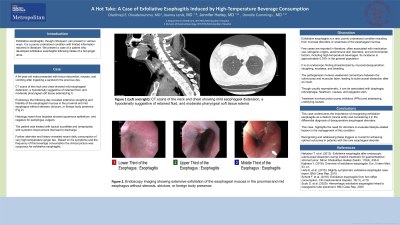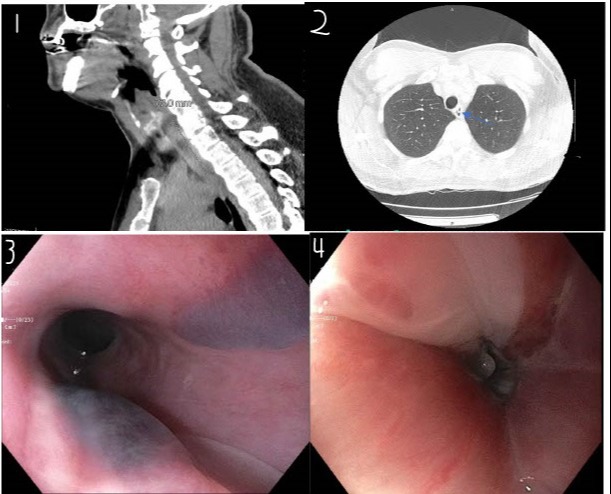Sunday Poster Session
Category: Esophagus
P0554 - Unmasking Exfoliative Esophagitis Induced by Hot Ginger Beverage Consumption: A Unique Case Presentation
Sunday, October 27, 2024
3:30 PM - 7:00 PM ET
Location: Exhibit Hall E

Has Audio

Oladimeji E. Oluaderounmu, MD
NYC Health + Hospitals/Metropolitan
New York, NY
Presenting Author(s)
Oladimeji E. Oluaderounmu, MD, Joanna Lenik, MD, Donelle Cummings, MD, Jennifer Harley, MD
NYC Health + Hospitals/Metropolitan, New York, NY
Introduction: Exfoliative esophagitis, though infrequent, can manifest in diverse ways. It is a poorly understood condition with limited information reported in literature. We present a case of a patient with exfoliative esophagitis following intake of a hot ginger drink
Case Description/Methods: A 64-year-old male presented with throat discomfort, nausea, and vomiting after ingesting a sandwich the previous day. CT scans of the neck and chest showed mild esophageal distension, a hypodensity suggestive of retained fluid, and moderate pharyngeal soft tissue edema((Fig.1, 2) Endoscopy revealed extensive exfoliation of the esophageal mucosa in the proximal and mid esophagus without stenosis, stricture, or foreign body presence (Fig.3, 4) Biopsy confirmed no malignancy, infectious agents, or autoimmune disorders. The patient was treated with topical sucralfate and omeprazole, with symptom improvement leading to discharge. Further inquiry revealed his daily consumption of hot ginger tea
Discussion: Exfoliative esophagitis is a rare, poorly understood condition resulting from mucosal disorders or esophageal mucosa weakness. Few cases are reported in literature, often associated with medication use, iatrogenic origins, autoimmune skin disorders, and environmental factors. It is an endoscopic finding characterized by mucosal desquamation, sloughing, exudates, and bleeding. The pathogenesis involves weakened connections between the submucosa and muscular layer, leading to submucosal dissection after an insult. Its incidence is about 0.03% of the general population. Though usually asymptomatic, it can be associated with dysphagia, odynophagia, heartburn, nausea, and epigastric pain. Treatment involves proton pump inhibitors (PPI’s) and addressing underlying causes. PPI’s aid in managing the condition through acid suppression, promoting mucosal healing. This case underscores the role of lifestyle factors, particularly the temperature of ingested liquids. Consuming hot beverages at elevated temperatures may contribute to mucosal damage and exfoliation, highlighting the need for awareness and moderation. This case underscores the importance of recognizing exfoliative esophagitis as a distinct entity and considering it in the differential diagnosis of esophageal disorders. It emphasizes the need for clinicians to evaluate lifestyle-related factors in managing this condition. Recognizing and addressing these triggers is crucial for achieving optimal outcomes in patients with this rare esophageal disorder

Disclosures:
Oladimeji E. Oluaderounmu, MD, Joanna Lenik, MD, Donelle Cummings, MD, Jennifer Harley, MD. P0554 - Unmasking Exfoliative Esophagitis Induced by Hot Ginger Beverage Consumption: A Unique Case Presentation, ACG 2024 Annual Scientific Meeting Abstracts. Philadelphia, PA: American College of Gastroenterology.
NYC Health + Hospitals/Metropolitan, New York, NY
Introduction: Exfoliative esophagitis, though infrequent, can manifest in diverse ways. It is a poorly understood condition with limited information reported in literature. We present a case of a patient with exfoliative esophagitis following intake of a hot ginger drink
Case Description/Methods: A 64-year-old male presented with throat discomfort, nausea, and vomiting after ingesting a sandwich the previous day. CT scans of the neck and chest showed mild esophageal distension, a hypodensity suggestive of retained fluid, and moderate pharyngeal soft tissue edema((Fig.1, 2) Endoscopy revealed extensive exfoliation of the esophageal mucosa in the proximal and mid esophagus without stenosis, stricture, or foreign body presence (Fig.3, 4) Biopsy confirmed no malignancy, infectious agents, or autoimmune disorders. The patient was treated with topical sucralfate and omeprazole, with symptom improvement leading to discharge. Further inquiry revealed his daily consumption of hot ginger tea
Discussion: Exfoliative esophagitis is a rare, poorly understood condition resulting from mucosal disorders or esophageal mucosa weakness. Few cases are reported in literature, often associated with medication use, iatrogenic origins, autoimmune skin disorders, and environmental factors. It is an endoscopic finding characterized by mucosal desquamation, sloughing, exudates, and bleeding. The pathogenesis involves weakened connections between the submucosa and muscular layer, leading to submucosal dissection after an insult. Its incidence is about 0.03% of the general population. Though usually asymptomatic, it can be associated with dysphagia, odynophagia, heartburn, nausea, and epigastric pain. Treatment involves proton pump inhibitors (PPI’s) and addressing underlying causes. PPI’s aid in managing the condition through acid suppression, promoting mucosal healing. This case underscores the role of lifestyle factors, particularly the temperature of ingested liquids. Consuming hot beverages at elevated temperatures may contribute to mucosal damage and exfoliation, highlighting the need for awareness and moderation. This case underscores the importance of recognizing exfoliative esophagitis as a distinct entity and considering it in the differential diagnosis of esophageal disorders. It emphasizes the need for clinicians to evaluate lifestyle-related factors in managing this condition. Recognizing and addressing these triggers is crucial for achieving optimal outcomes in patients with this rare esophageal disorder

Figure: Fig. 1, 2: CT scans of the neck and chest showing mild esophageal distension, a hypodensity suggestive of retained fluid, and moderate pharyngeal soft tissue edema
Fig 3, 4: Extensive exfoliation of the esophageal mucosa in the proximal and mid esophagus
Fig 3, 4: Extensive exfoliation of the esophageal mucosa in the proximal and mid esophagus
Disclosures:
Oladimeji Oluaderounmu indicated no relevant financial relationships.
Joanna Lenik indicated no relevant financial relationships.
Donelle Cummings: AlphaSights – Advisor or Review Panel Member. TDG Health – Advisor or Review Panel Member.
Jennifer Harley indicated no relevant financial relationships.
Oladimeji E. Oluaderounmu, MD, Joanna Lenik, MD, Donelle Cummings, MD, Jennifer Harley, MD. P0554 - Unmasking Exfoliative Esophagitis Induced by Hot Ginger Beverage Consumption: A Unique Case Presentation, ACG 2024 Annual Scientific Meeting Abstracts. Philadelphia, PA: American College of Gastroenterology.
